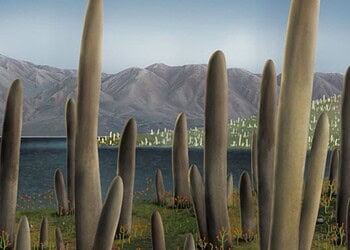For millions of years life was almost exclusively confined to the oceans, while on land primitive plant species dotted the landscape. The transition from marine to land life is poorly understood, given fossil records hundreds of million years old are rare. The striking finding of what looks like the oldest fungus is helping researchers piece together the grand picture. The fungus called Tortotubus helped plant life by holding the soil together and recycling nutrients. An early land lover, the Tortobu might have been a key part of the land ecosystem that eventually grew to foster complex land life.

Tortotubus was smaller than a human hair, and one of the first organisms to thrive on land. Judging from the hundreds of tiny fossils 440 to 450 million years old, this ancient fungus was widespread. Samples were found in Libya and Chad, but also New York State, Sweden and Scotland.
During these times, the oceans were teeming with complex life like jawless fish, arthropods, squid relatives and more. The land was a different matter entirely. Bacteria, simple mossy and lichen-like plants were all that could be found. That’s because organisms had a lot of challenges to face. The UV exposure was a lot more threatening seeing there wasn’t much ozone to block the rays, temperature varied wildly — too fast for creatures to have time to adapt — and organic matter was scarce.
Creatures like Tortotubus probably weren’t the first land organisms, but no older such fossil was found. There’s a lot subsequent terrestrials have to thank Tortobus, too.
“By the time Tortotubus went extinct, the first trees and forests had come into existence,” said Martin Smith of Britain’s Durham University, who conducted the research while at the University of Cambridge.. “This humble subterranean fungus steadfastly performed its rotting and recycling service for some 70 million years, as life on land transformed from simple crusty green films to a rich ecosystem that wouldn’t look out of place in a tropical greenhouse today.”
It’s been a good week for science, it seems. Another study out of the Massachusetts Institute of Technology found an ancient sea sponge was likely the first animals on Earth, having been around for at least 640 million years. As researchers find more such striking fossils, humanity might one day understand how it all started.






